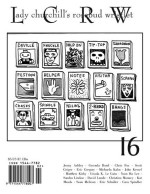White shapes fell from Mei’s hands: here a narrow triangle, there a half-ripped crescent. A shadow cut across the pile of scraps on the floor. Mei stopped, her scissors gaping wide and bright. She did not look away from the blades.
The voice came, not from the TV. It said her name once, twice–a third time, stopping short of four. The words fell on her like snow, individual sounds lost in the voice’s inflections. The hands took away her scissors.
Mei understood what the words wanted. The paper shadows she had cut out were safe in her sleeve, a frail, itchy presence against her skin. She would have to finish the last one later. The white fragments she swept up and scattered into the recycling bin. The voice lowered in pitch, intensified. Mei opened and closed her hands, making them into scissors. Those shadow-blades could not cut her.
The moon curved across the window and over the sky. Night followed in its wake. After the hands tucked her in and the feet took the voice away, Mei brought her family out from under the pillow and laid them across the blanket, over her lap. Mama and Dada and her laughing, laughing big brother.
She remembered the smoke in her lungs, the hot gritty cinders. She remembered a bed that was not this one, with a lumpier quilt, and her brother across the room. She remembered.
The only one missing in the family was Mei. She did not have scissors to finish cutting out the last paper doll. If she tiptoed out of bed, the feet would come and the hands would hold her until she pretended sleep again.
She had her own hands. Folding and refolding, wetting the edges with her tongue, Mei freed herself from the shapes of paper and fluttered next to them, white, flammable, together.
Fantasy flash. A melancholy paper-doll story. Thanks to my sister, Beth Bernobich, Paul Huwe, Mrissa, Charles M., and Jacqueline A. Lott. Appeared in Lady Churchill’s Rosebud Wristlet no. 16.
